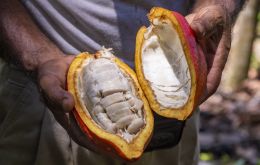MercoPress. South Atlantic News Agency
Politics
-
Wednesday, July 15th 2020 - 08:32 UTC
Nestlé and Cargill face demands from slave descendants of Ivory Coast cocoa farms

The US Supreme Court will decide whether American corporations can be sued for alleged human rights abuses occurring abroad under a 1789 law, agreeing to hear appeals by two companies: Cargill Inc and a Nestle SA subsidiary: accused of knowingly helping perpetuate slavery at Ivory Coast cocoa farms.
-
Wednesday, July 15th 2020 - 08:28 UTC
Europe opens consultation sessions on how to combat fake news and ensure free and fair elections

The European Commission will this Wednesday seek input from the public and civic bodies on how to combat fake news and ensure free and fair elections, a move that could lead to new rules targeting social platforms such as Facebook Inc and Alphabet Inc's Google.
-
Wednesday, July 15th 2020 - 08:15 UTC
Suriname elects new president replacing four decades of dictator Bouterse

Mercosur associate, Suriname elected a new president Monday, ending the dictatorial rule of Desi Bouterse. Chan Santokhi, an Indian-origin former police chief, won a landslide victory in the general elections conducted in the country in May.
-
Tuesday, July 14th 2020 - 09:58 UTC
Approval of Argentine president pandemic policies eroding, but concern with the virus is still very strong

Approval of Argentine president Alberto Fernandez handling of the pandemic continued to slide during the last week and is at levels similar to those at the start of the quarantine, according to the latest opinion poll from Poliarquia made public over the weekend in Buenos Aires daily La Nacion.
-
Tuesday, July 14th 2020 - 09:45 UTC
Bolsonaro is feeling “very good” and ready to return to work

Brazil President Jair Bolsonaro said on Monday he is feeling “very good” and will return to work if he tests negative for the new coronavirus on Tuesday, but that he will continue to isolate himself until he is free of the virus.
-
Tuesday, July 14th 2020 - 09:31 UTC
Justice lifts restraining order on Trump family book written by a niece

The New York Supreme Court lifted a stay on Monday that temporarily blocked Donald Trump’s niece from publishing a tell-all book that offers an unflattering look of the U.S. president and his family.
-
Tuesday, July 14th 2020 - 08:35 UTC
Beijing warns Canberra on Hong Kong and advises Chinese citizens not to travel Australia

China stepped up a travel warning to Australia on Monday, telling its citizens of a risk of being searched “arbitrarily” by law enforcement authorities, as tensions between both countries grow. The foreign ministry's latest notice comes a month after Beijing warned of “discrimination” against Chinese people in Australia, telling its citizens not to travel there.
-
Tuesday, July 14th 2020 - 08:31 UTC
Sweden supports a robust response to China's new security law on Hong Kong

Sweden said on Monday it supported Franco-German efforts for a robust response to China's new security law on Hong Kong, joining Denmark and the Netherlands in pushing the European Union to consider countermeasures on Beijing.
-
Tuesday, July 14th 2020 - 08:02 UTC
Incident with a US Senator caught in American Airlines flight without a mask

American Airlines said on Monday it had reached out to U.S. Senator Ted Cruz after a photo of the Texas Republican without a mask aboard an airplane was posted on a social media site.
-
Tuesday, July 14th 2020 - 08:00 UTC
Australia's wool industry urges caution with Beijing since China takes 78% of the greasy clip

Australia's wool industry has urged caution as politicians seek to steer exporters away from an over-reliance on China. A parliamentary committee is holding hearings on Tuesday and Wednesday as it examines how to diversify Australia's trade and investment profile.
